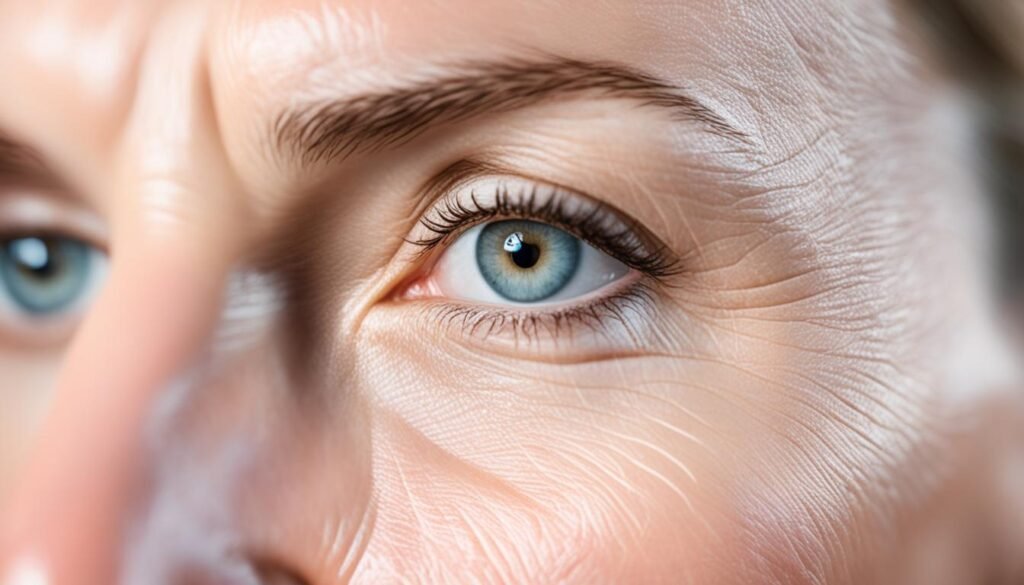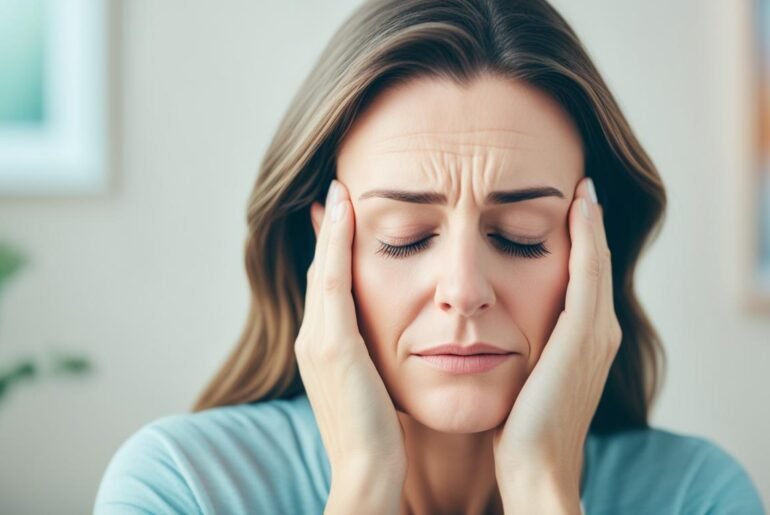Did you know that psychological stress can accelerate the aging process of your skin? It’s not just external factors like UV exposure or pollution that contribute to wrinkles and other signs of aging. The impact of mental stress on skin health is significant and deserves our attention.
Chronic mental stress can lead to physiological changes in the skin, such as increased wrinkles, acne, dryness, and weakened immune function. Stress hormones like cortisol play a crucial role in these effects, disrupting the skin’s barrier function and contributing to inflammation and damage.
Understanding the link between mental health and skin aging is essential for developing effective strategies to protect our skin and manage stress-related aging. In this article, we will explore the impact of stress on the skin, the role of inflammation and the skin barrier, and strategies for managing stress-related skin aging.
Key Takeaways:
- Psychological stress can accelerate the aging process of the skin.
- Chronic stress hormones like cortisol can lead to wrinkles, acne, and dryness.
- Stress can weaken the skin’s barrier function and increase inflammation.
- Effective stress management techniques and self-care practices are crucial for preventing stress-related skin aging.
- Understanding the link between mental health and skin aging is crucial for developing strategies to protect our skin and promote optimal aging.
The Impact of Cortisol on the Skin
One of the key hormones involved in the physiological response to stress is cortisol. When the body is under stress, cortisol is released, which can have detrimental effects on the skin. Chronic exposure to cortisol can lead to accelerated skin aging, including increased wrinkles, loss of elasticity, and reduced collagen production.
Moreover, cortisol can impair the skin’s barrier function and disrupt the balance of oil production, leading to acne and other skin issues. Both cognitive stress (mental stress) and emotional stress can contribute to these negative effects on the skin, resulting in premature aging.
It is important to understand the impact of stress on the skin and take proactive measures to manage stress levels. By implementing stress management techniques and adopting a holistic approach to skincare, individuals can help minimize the effects of cortisol and promote healthier, more youthful-looking skin.
The Role of Inflammation in Stress-Related Aging
Chronic stress can have profound effects on our skin health, particularly in relation to the aging process. One critical aspect of this is the role of inflammation. When we experience ongoing stress, it can lead to increased inflammation in the body, which in turn has significant implications for our skin.
Inflammation can cause structural damage to the skin, compromising its integrity and leading to various signs of aging. It impairs the skin’s healing ability, making it more difficult for wounds to mend and for the skin to recover from damage. Additionally, chronic inflammation can contribute to the breakdown of collagen and elastin fibers, which are essential for maintaining the skin’s firmness and elasticity.
Furthermore, inflammation weakens the skin’s natural defense mechanisms, leaving it more susceptible to environmental damage and infections. This can result in various skin issues, such as redness, irritation, and sensitivity.
Managing stress and implementing effective stress management techniques are crucial for preventing inflammation and mitigating its negative effects on the skin. By reducing stress levels, we can help regulate the body’s inflammatory response and promote healthier skin aging.
There are various stress management strategies that can be incorporated into our daily lives to support skin health. These may include practices such as meditation, yoga, deep breathing exercises, and engaging in hobbies or activities that promote relaxation and reduce stress. It is also important to prioritize self-care and establish a balanced lifestyle that includes regular exercise, healthy nutrition, and adequate sleep.
By taking proactive steps to manage stress, we can not only improve our mental well-being but also protect our skin from the damaging effects of inflammation and promote a healthy, youthful complexion.
The Impact of Stress on Skin Barrier Function

Chronic mental stress can have detrimental effects on the skin’s barrier function, which is essential for maintaining skin health and protecting against external stressors. When the skin’s barrier function is compromised, it becomes more susceptible to water loss, dryness, and irritants, increasing the risk of skin issues. Additionally, chronic stress can disrupt the balance of the skin microbiome, further compromising skin health. Implementing effective stress management techniques and using skincare products that support the skin’s barrier function are crucial for preventing stress-related skin aging.
“Chronic mental stress can disrupt the skin’s barrier function, leading to increased water loss, dryness, and susceptibility to irritants and allergens.”
Stress management techniques play a vital role in minimizing the negative impact of stress on the skin barrier. These techniques may include practicing relaxation exercises, such as deep breathing and meditation, which can help reduce stress levels and promote overall well-being. Additionally, prioritizing self-care and engaging in a healthy lifestyle, including regular exercise and quality sleep, can also contribute to maintaining a healthy skin barrier. Using skincare products that contain natural moisturizers and ingredients that strengthen the skin’s barrier function, such as ceramides and hyaluronic acid, can provide added support.
To illustrate the importance of stress management for maintaining a healthy skin barrier, consider the following table:
| Effect | Description |
|---|---|
| Increased water loss | Chronic stress can impair the skin’s ability to retain moisture, leading to dryness and dehydration. |
| Susceptibility to irritants | A weakened skin barrier allows irritants and allergens to penetrate more easily, triggering skin reactions and inflammation. |
| Compromised skin microbiome | Chronic stress disrupts the balance of the skin microbiome, potentially leading to dysbiosis and increased risk of skin issues. |
By implementing stress management techniques and taking steps to support the skin’s barrier function, individuals can protect their skin from the negative effects of stress, promoting healthier and more resilient skin.
References:
- Sandhu, S. (2021). The impact of psychological stress on skin. Clinics in Dermatology, 39(4), 446–452.
- Hodeib, A. A., Hassan, H. I., & El-Mofty, S. K. (2021). Psychological stress and its effects on skin in acne vulgaris patients. Dermatology Research and Practice, 2021, 6636152.
The Link Between Stress and Impaired Wound Healing
Chronic stress can have profound effects on the body’s ability to heal wounds effectively. Research studies have consistently shown that stress can delay wound healing by impacting crucial biological processes involved in the repair and regeneration of the skin.
One of the key ways in which stress affects wound healing is by disrupting the production and activity of immune cells. Stress-related changes in immune function can impair the body’s ability to mount an effective immune response, leading to slower healing times and an increased risk of complications.
Additionally, stress can also influence the production and function of growth factors that are necessary for wound healing. These growth factors play a crucial role in the formation of new blood vessels, collagen synthesis, and the recruitment of cells involved in tissue repair. When stress disrupts the production and activity of these growth factors, the healing process is negatively affected.
Collagen, a structural protein that provides strength and support to the skin, is also a key player in wound healing. Stress can impair collagen synthesis, leading to delays in scar formation and a compromised healing process.
By implementing effective stress management techniques, individuals can support optimal wound healing and minimize the risk of complications. Managing stress not only promotes a healthier mental and emotional state, but it also has tangible benefits for physical well-being, including the skin’s ability to heal wounds efficiently.
Reducing stress levels through practices such as mindfulness, relaxation exercises, and engaging in activities that promote a sense of calmness and well-being can help create an environment conducive to optimal wound healing. It is important to prioritize self-care and stress management as part of a comprehensive approach to promoting skin health and preventing stress-related skin aging.
By actively managing stress and reducing its impact on wound healing processes, individuals can support their skin’s natural ability to recover and repair, minimizing the risk of delayed healing and promoting optimal skin health.
The Effect of Stress on Skin Microbiome

The skin microbiome, which consists of a diverse community of microorganisms, plays a vital role in maintaining skin health and preventing inflammation. Chronic stress can disrupt the balance of the skin microbiome, leading to dysbiosis and an increased risk of skin issues, such as acne, eczema, and dermatitis.
When we experience stress, it can alter the composition of our skin microbiome, causing an imbalance between beneficial and harmful bacteria. This dysbiosis can compromise the skin’s natural defenses and increase its susceptibility to inflammatory conditions.
Stress-induced dysbiosis can trigger increased sebum production, which creates an ideal environment for acne-causing bacteria to thrive. It can also disrupt the protective barrier function of the skin, making it more prone to irritation and inflammation.
Stress Management for Maintaining a Healthy Skin Microbiome
Managing stress is crucial for maintaining a balanced and healthy skin microbiome. Implementing stress management techniques can help mitigate the negative impact of stress on the skin and support its overall health.
- Practice relaxation techniques: Engaging in activities such as meditation, deep breathing exercises, and yoga can help reduce stress levels and promote a sense of calm.
- Maintain a healthy lifestyle: Regular exercise, adequate sleep, and a balanced diet contribute to overall well-being, which can positively impact the skin microbiome.
- Establish a skincare routine: Using gentle cleansers, moisturizers, and products that support the skin’s natural barrier function can help restore and maintain a healthy microbiome.
- Seek professional help: If chronic stress is significantly affecting your quality of life and skin health, consider consulting a healthcare professional or therapist who can provide guidance and support.
By prioritizing stress management techniques and maintaining a healthy lifestyle, individuals can nurture a balanced skin microbiome, minimize the negative effects of stress on skin health, and promote overall skin well-being.
Epigenetic Effects of Stress on Skin Aging
Recent research has shed light on the role of epigenetics in the aging process, revealing the impact of chronic stress on epigenetic modifications. Epigenetic changes refer to alterations in gene expression that are not caused by changes in the DNA sequence itself. These modifications can affect various aspects of cellular function, including those related to skin aging.
Stress management techniques play a vital role in mitigating the epigenetic effects of stress and promoting healthier skin aging. Mindfulness activities and relaxation exercises have been shown to have a positive impact on epigenetic modifications, helping to counteract stress-induced changes in gene expression.
“The epigenetic effects of stress on skin aging can be minimized through the implementation of stress management techniques.”
By incorporating stress management practices into our daily routines, we can influence the way our genes are expressed, ultimately creating an environment conducive to healthier skin aging. These techniques not only benefit our overall well-being but also play a crucial role in maintaining skin health and preventing stress-related aging.
The Role of Mindfulness Activities
Mindfulness activities, such as meditation and yoga, have gained increasing popularity for their ability to reduce stress levels and promote a sense of calm. These practices have been shown to positively impact epigenetic modifications, favoring gene expression patterns associated with improved skin health and resilience.
Studies have demonstrated that regular mindfulness practice can enhance the expression of genes involved in skin barrier function, collagen production, and antioxidant defense. Additionally, mindfulness activities have been shown to decrease stress-related inflammatory markers in the skin, promoting a healthier and more youthful complexion.
Relaxation Exercises for Skin Health
Engaging in relaxation exercises, such as deep breathing and progressive muscle relaxation, offers another effective approach to manage stress-induced epigenetic changes. These techniques help activate the body’s natural relaxation response, counteracting the effects of stress hormones on the skin.
Relaxation exercises have been found to promote the expression of genes responsible for DNA repair, cellular rejuvenation, and reduced inflammation. By incorporating these exercises into our daily routines, we can support healthy skin aging and minimize the negative impact of chronic stress on the epigenetic mechanisms involved in aging.
Epigenetic Effects of Stress on Skin Aging
| Epigenetic Modification | Impact on Skin Aging |
|---|---|
| Altered DNA methylation | Affects gene expression related to collagen synthesis and skin regeneration |
| Histone modifications | Influences gene expression linked to skin barrier function and immune response |
| Non-coding RNA regulation | Can affect gene expression involved in skin inflammation and wound healing |
Understanding the epigenetic effects of stress on skin aging is essential for developing effective strategies to promote skin health and prevent stress-related aging. By incorporating mindfulness activities, relaxation exercises, and other stress management techniques into our lifestyles, we can positively influence the expression of genes involved in skin aging, supporting a healthier and more youthful complexion.
Strategies for Managing Stress-Related Skin Aging

To minimize the negative effects of stress on skin aging, implementing stress management strategies is crucial. By prioritizing self-care and adopting healthy lifestyle habits, individuals can protect their skin from the detrimental impact of chronic stress.
1. Lifestyle Modifications:
Regular exercise, healthy nutrition, and quality sleep are essential lifestyle modifications for managing stress-related skin aging. Exercise helps reduce stress levels by releasing endorphins, improving blood circulation, and promoting overall well-being. A balanced diet rich in antioxidants, vitamins, and minerals supports skin health and resilience. Adequate sleep is crucial for skin rejuvenation and repair, as it allows the body to replenish and restore.
2. Relaxation Techniques:
Meditation, deep breathing exercises, and skincare rituals can effectively reduce stress levels and promote skin health. Meditation and deep breathing techniques help calm the mind, reduce cortisol levels, and enhance relaxation. Incorporating a skincare routine with gentle massage and soothing products can provide a sense of self-care and relaxation, contributing to overall stress reduction.
3. Professional Help:
Seeking professional help, such as therapy or counseling, is beneficial for managing chronic stress and its impact on skin aging. Professionals can provide guidance and support in developing coping mechanisms, stress reduction strategies, and improving mental well-being. Therapy sessions can help individuals address underlying causes of stress and develop effective strategies for stress management.
The Importance of Self-Care for Skin Health and Stress Management
Engaging in self-care practices is crucial for both skin health and stress management. Taking time for activities that promote relaxation, such as baths, massages, and skincare routines, can help reduce stress levels and improve overall well-being. Additionally, prioritizing self-care can help individuals create a sense of control and balance in their lives, reducing the negative impact of stress on skin health and overall aging.
| Strategies | Benefits |
|---|---|
| Regular exercise, healthy nutrition, and quality sleep | – Reduces stress levels – Enhances overall well-being – Supports skin health and resilience |
| Relaxation techniques (meditation, deep breathing exercises, skincare rituals) | – Reduces cortisol levels – Promotes relaxation and stress reduction – Improves skin health and appearance |
| Seeking professional help (therapy, counseling) | – Provides guidance and support – Develops effective stress management strategies – Improves mental well-being |
The Importance of Self-Care for Skin Health and Stress Management

Engaging in self-care practices is essential for both skin health and stress management. Taking time for activities that promote relaxation, such as baths, massages, and skincare routines, can help reduce stress levels and improve overall well-being.
Prioritizing self-care allows individuals to create a sense of control and balance in their lives, minimizing the negative impact of stress on skin health and overall aging. By incorporating self-care practices into their daily routines, individuals can better manage stress and prevent its detrimental effects on their skin.
The Benefits of Self-Care for Stress Management
Self-care activities provide valuable opportunities to unwind, recharge, and rejuvenate. Whether it’s indulging in a long, warm bath or pampering oneself with a soothing facial mask, these moments of self-care can help alleviate the physical and mental strain associated with stress.
“Self-care is not selfish. It’s essential. Taking care of yourself allows you to better navigate life’s challenges and maintain your well-being.”
Engaging in self-care practices can also improve mental health and resilience. It allows individuals to prioritize their own needs and develop healthy coping mechanisms to manage stress effectively. By incorporating self-care into their daily routine, individuals can build resilience and enhance their ability to handle stressors, leading to improved overall well-being.
Self-Care Activities for Skin Health and Stress Management
There are numerous self-care activities that individuals can incorporate into their lives to promote both skin health and stress management. Here are some examples:
- Taking relaxing baths with aromatherapy oils or bath salts
- Practicing regular skincare routines that include cleansing, moisturizing, and gentle exfoliation
- Engaging in facial massages to promote relaxation and improve circulation
- Participating in stress-relieving activities such as yoga, meditation, or deep breathing exercises
- Enjoying calming hobbies such as painting, gardening, or reading
By incorporating these self-care activities into their daily lives, individuals can create a self-care routine that addresses both their skin health and stress management needs.
The Importance of Prioritizing Self-Care
It is crucial to prioritize self-care as part of an overall approach to managing stress and promoting skin health. By taking time for oneself and engaging in activities that promote relaxation and well-being, individuals can reduce stress levels and prevent stress-related skin aging.
Remember, self-care is not selfish but a necessary investment in one’s own health and happiness. By prioritizing self-care, individuals can enhance their overall well-being, maintain healthy skin, and effectively manage the negative impact of stress on mental and physical health.
Conclusion
Chronic mental stress is a significant contributing factor to the aging process of the skin. It can have detrimental effects such as accelerated skin aging, impaired barrier function, increased inflammation, and compromised wound healing. To mitigate these effects and promote optimal skin health, it is essential to understand the impact of stress on the skin and implement effective stress management techniques.
By prioritizing self-care and engaging in stress reduction strategies, individuals can protect their skin from the negative impact of chronic stress. Taking time for relaxation activities like baths, massages, and skincare rituals can help reduce stress levels and improve overall well-being. Additionally, incorporating healthy lifestyle choices such as regular exercise, nutritious diet, and quality sleep can further support stress management and skin health.
Stress management techniques, including mindfulness activities and relaxation exercises, have been shown to mitigate the negative effects of stress on the skin. Seeking professional help such as therapy or counseling can also be beneficial for managing chronic stress. By implementing these strategies and adopting a holistic approach to self-care, individuals can effectively prevent stress-related skin aging and promote optimal skin health.
FAQ
What is the link between mental stress and skin aging?
Chronic mental stress can have significant effects on the aging process of the skin. Stress hormones, such as cortisol, can lead to physiological changes in the skin that contribute to wrinkles, acne, dryness, and other signs of aging.
How does cortisol impact the aging process of the skin?
Cortisol, a stress hormone, can accelerate skin aging by increasing wrinkles, reducing elasticity, and impairing collagen production. It can also disrupt the skin’s barrier function and oil production, leading to acne and other skin issues.
Does stress contribute to inflammation and skin aging?
Yes, chronic stress can lead to increased inflammation in the body, which can cause structural damage to the skin, impair its healing ability, and contribute to the breakdown of collagen and elastin fibers.
How does stress affect the skin’s barrier function?
Chronic mental stress can disrupt the skin’s barrier function, leading to increased water loss, dryness, and susceptibility to irritants and allergens. It can also impair the skin’s microbiome and contribute to skin issues.
Can stress impact wound healing?
Yes, stress can delay wound healing by affecting the production and activity of immune cells, growth factors, and collagen synthesis. Managing stress is crucial for optimal wound healing and reducing the risk of complications.
Does stress affect the skin’s microbiome?
Chronic stress can disrupt the balance of the skin microbiome, increasing the risk of skin issues such as acne, eczema, and dermatitis. Implementing stress management techniques and maintaining a healthy lifestyle can help support a balanced skin microbiome.
What are the epigenetic effects of stress on skin aging?
Recent research has shown that chronic stress can cause epigenetic changes that affect gene expression and contribute to age-related skin issues. Practicing stress management techniques can mitigate these effects and promote healthier skin aging.
Implementing stress management strategies such as exercise, healthy nutrition, quality sleep, relaxation techniques, and seeking professional help are crucial for minimizing the negative effects of stress on skin aging.
How important is self-care for skin health and stress management?
Engaging in self-care practices such as relaxation activities, baths, massages, and skincare routines can help reduce stress levels and improve overall well-being. Prioritizing self-care is essential for minimizing the negative impact of stress on skin health and overall aging.
What is the impact of chronic stress on skin aging?
Chronic mental stress can accelerate skin aging, impair the skin’s barrier function, increase inflammation, and compromise wound healing. Understanding and managing stress are crucial for protecting skin health and minimizing stress-related aging.




